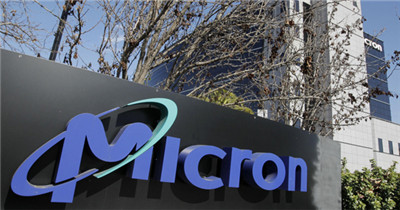(单词翻译:单击)
US Memories Inc may sound like a greeting-card company. In fact, it was the name for a proposed industry-wide joint venture to keep the US in the memory chip business at the end of the 1980s, as the sector reeled from a Japanese corporate onslaught.
美国记忆公司(US Memories Inc)听起来可能像一家贺卡公司。实际上,这是上世纪80年代末为保持美国在芯片业中的地位,拟成立的全行业合资公司的名字,当时美国芯片业在日本公司的冲击下茫然失措。
US Memories is a forgotten footnote in the technology history books. The attempt at collective action failed when some of the backers got cold feet. Instead, the fight back, when it came, took a far more American form: an entrepreneurial start-up from the unlikely location of Boise, Idaho, called Micron Technology.
美国记忆公司在科技史书籍上是一个被遗忘的注脚。当一些支持者临阵退缩的时候,集体努力失败了。实际上,最终发起的反击采取了更为美国的形式:一家名为美光科技(Micron Technology)的创业企业,公司所在地令人意外地位于爱达荷州博伊西。

Now the US faces another challenge from Asia in the chips that act as one of the most basic components of the digital world. News this month that Tsinghua Unicom, an offshoot of Beijing’s Tsinghua University, has been weighing up an offer for Micron has provoked a predictable ripple of nationalist angst. When kites like this are flown in public, it is often to find out what the reaction to a formal offer would be. On cue, Republican senator John McCain worried publicly about the “potential national security implications” if the US lost a significant position in memory chips. That Tsinghua is a Chinese state-owned company was among the factors weighing on the his mind.
现在,美国在芯片业面临亚洲的又一次挑战——芯片是数字世界中最基本的部件之一。本月有消息称,清华大学(Tsinghua University)旗下清华紫光(Tsinghua Unigroup)一直在考虑对美光科技发起收购要约,这激起了意料之中的民族主义愤怒。当此类消息被公诸于众,人们往往可以发现,对正式收购要约的反应将是什么。就在这个时候,共和党参议员约翰麦凯恩(John McCain)公开表示担忧:如果美国丧失记忆芯片行业中的重要地位,“可能对国家安全造成什么影响”。清华紫光是一家中国国有公司,这正是他担忧的因素之一。
Much has changed in the chip world over the past quarter century — but some things have not, in either politics or technology. Memory chips still occupy the same paradoxical place in the tech universe: though low margin commodity products in a market subject to vicious cyclical swings, they demand advanced design and manufacturing techniques and huge capital investment. They are also key components in military systems — the reason that many analysts believe the US is extremely unlikely to approve a formal takeover offer, should it materialise.
在过去25年里,芯片世界已经发生了很大的变化——但一些事情并未改变,无论是政治还是科技方面。记忆芯片在科技领域仍处于和以前一样矛盾的处境:尽管记忆芯片是低利润率产品,所处市场容易受到恶性周期性波动的影响,但它们要求有先进的设计和制造技术,以及巨额的资本投资。它们也是军事系统中的关键部件,正因为此,许多分析师相信,如果清华紫光正式发出收购要约,美国极不可能批准。
One thing that has changed since the 1980s is the global ambition of China’s tech industry. Given its massive share of global electronics manufacturing, building a position in silicon — the key component in most systems — has become a national priority. Some 41 per cent of Micron’s sales are to Chinese manufacturers. China’s attempt to consolidate its position as the world’s electronics manufacturing hub relies, in the long term, on being able to establish a domestic chip industry.
自上世纪80年代以来,发生了一个变化:中国科技业的全球抱负。鉴于中国在全球电子制造业中的巨大份额,在硅领域占据一席之地已成为一项国家首要任务——硅是多数系统中的关键材料。美光约41%的销售额来自中国制造商。长期而言,中国巩固其全球电子制造中心地位的努力,取决于能否建立本国的芯片产业。
Up to now, the efforts have failed dismally. But Tsinghua’s tentative takeover approach seems to point to a change in strategy that could have implications for China’s involvement in global tech markets far beyond chips.
迄今为止,这些努力都遭遇了惨淡的失败。但清华紫光的试探性收购举措似乎表明中国策略发生了改变,这可能对中国涉足远不止芯片业的全球科技市场具有重要意义。
Chinese companies have often stood accused internationally of copying technology. So joining the free-market takeover game and paying a fair price to acquire the strategic technology of a company like Micron would mark a welcome turn of events, says Mark Anderson, a US tech analyst who has criticised China’s approach to intellectual property. The slow progress made by China’s existing chip industry may explain the boldness of Tsinghua’s move. Shanghai-based semiconductor maker SMIC has represented the most visible attempt at creating a national champion. But it lost a high-profile intellectual property case brought by Taiwan’s TSMC. Nor has licensing technology from US competitors succeeded. Nearly a decade ago, SMIC was granted a licence to IBM’s 45 nanometre chipmaking technology — already, at the time, a technology that was getting long in the tooth.
中国企业在国际上常常遭遇抄袭别国技术的指责。曾批评过中国在知识产权方面做法的美国科技分析师马克褠德森(Mark Anderson)称,因此,中国加入自由市场收购大战,并为获得美光之类公司的战略性技术支付合理的价钱,标志着一种受欢迎的转向。中国现有芯片产业的缓慢发展或许可以解释清华紫光此举的胆略。位于上海的半导体制造商中芯国际(SMIC)为打造全国行业领军企业做出了最明显的努力。但中芯国际在台湾芯片制造商台积电(TSMC)提起的一起引人关注的知识产权诉讼中败诉。从美国竞争对手那里获得技术许可也未能带来成功。将近10年前,中芯国际从IBM获得了45纳米芯片制造技术许可,但该技术在当时已现老态。
China’s ability to access more cutting-edge technology may be growing. IBM, for instance, has changed its business model in China when it comes to high-end servers: rather than trying to sell machines based on its Power chip technology, it is now offering to license the technology to Chinese manufacturers. But a full-blown acquisition of a significant international player like Micron would represent a far more ambitious expansion of China’s chip sector. Micron is currently worth almost $20bn, making it a significant bite even by the standards of the takeover wave that has swept through the chip industry this year.
中国获得更尖端技术的能力可能正在增强。例如,IBM在高端服务器领域已经改变了在中国的商业模式:现在,它为中国制造商提供技术许可,而非试图销售基于其Power芯片技术的机器。但是,全面收购类似美光这样的国际芯片巨头,代表着中国芯片行业更加雄心勃勃的扩张。美光当前的市值接近200亿美元,即使按照今年席卷芯片行业的收购潮的标准,这也是一个难以吞下的大块头。
Running a far-flung operation like Micron also would be a significant challenge for a company without a record in global business. Micron’s main facilities are in the US, Singapore and to a lesser degree Japan. Effective management of international businesses like this is a major challenge for Chinese companies looking to move overseas, says Joel Backaler, a business consultant and expert on Chinese international investment.
管理像美光这样业务广泛的企业,对于一家没有全球业务经验的企业来说也将是一个艰巨的挑战。美光主要的生产基地位于美国和新加坡,在日本也有一少部分。商业顾问、中国国际投资领域专家周乐达(Joel Backaler)说,有效地管理此类国际企业对于期待走向海外的中国企业来说是一个巨大挑战。
Given the likely resistance from Washington, a Tsinghua acquisition of Micron looks a stretch. But it could be the first sign that a new phase of Chinese tech expansionism is about to begin.
考虑到可能遭到来自华盛顿的抵制,清华紫光收购美光看起来希望渺茫。但这可能是中国科技扩张即将进入新阶段的首个标志。


